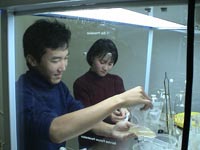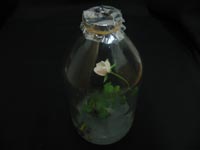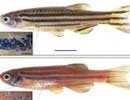 |
| Nguyen Hong Vu in the laboratory |
A very new trend since the beginning of 2006 is that many young people have come up with creative ideas that have great potential for application in life… “All ideas are encouraged for everyone to boldly present, whether simple or complex, easy to understand or quirky” – that is the motto of many young creative groups today.
“What factors cause roses to bloom as desired?” is a question that flower growers and many researchers have not found a clear answer to for a long time. Yet Nguyen Hong Vu – a fourth-year student in the Biology Department at the University of Science in Ho Chi Minh City – after a year and a half of diligent research in the laboratory has found the answer.
| Nguyen Hong Vu could write a doctoral thesis
According to Dr. Duong Tan Nhat – Deputy Director of the Dalat Institute of Biology, this is a risky and scientifically challenging topic, with only a handful of researchers in the world having succeeded, and some have spent their entire lives without making a discovery. It could lead to a doctoral thesis as it explains the mechanism of flowering under artificial conditions. The successful blooming of roses in vitro has significant implications for basic scientific research such as breeding and genetics, as well as opening up a new market for mini roses in test tubes suitable for modern office spaces, with distinct benefits such as: low maintenance, small footprint, long flower lifespan… Hong Yen |
Vu recounts that while in his third year, Professor Duong Tan Nhat, who taught the plant biotechnology course, suggested that Vu undertake a research project on roses blooming in vitro. Vu accepted the project for a very… romantic reason: a love for roses. “After accepting the project, I started to feel anxious because many researchers before me had not succeeded. After a few days of thinking, I decided to go for it, because being afraid of failure before even starting is not my character,” Vu said. After class, he would go online to find materials. Vu noted: “Around the world, methods have been developed for many types of flowers to bloom in vitro, but for roses, there is only one research project from Singapore in 2000. However, this documentation only opened the door to the initial stages of researching the factors affecting rose blooming.” Vu had to ask his professor to contact universities around the world to send relevant materials related to successful in vitro flowering research for further study.
 |
|
Roses blooming in vitro |
With foundational knowledge, Vu traveled to Dalat, went to the Institute of Biology to request to conduct experiments, and then went to Dalat market to buy various flower varieties for culturing samples. After more than a year, Vu conducted research on six rose varieties, completing 80 experiments. However, after a year of trying and retrying various parameters regarding light, nutrients, and plant growth regulators… most ended in failure. “There were moments when I felt discouraged; a whole year had passed with no glimmer of hope while the graduation report deadline was approaching. Thinking of the effort, the trips, the sleepless nights monitoring, and considering my supportive family, I pushed myself to keep going.” With just over six months until the result announcement, Vu decided to change the components of the medium in the test tube, and this bold decision “forced” the roses to bloom in vitro. This resounding success earned him a perfect score from the review committee.
After this success, Vu wrote a report and submitted his research to the journal “Cell, Tissue, and Organ Culture.” To date, after several exchanges of information, the journal representatives have announced they will publish Vu’s article. Having a research project published in an international specialized journal is a significant opportunity for Vu to gain recognition in the scientific community…
Meeting Vu at the University of Science, he excitedly shared the good news with us: he has just received a full scholarship from South Korea in the field of Molecular Biology in Medicine. Vu has completed the enrollment procedures and will leave for study after celebrating Tet with his family.
Thien Long





















































